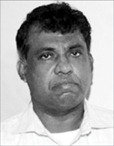 One and a half years after the conclusion of the war in the North of Sri Lanka, thousands of displaced persons continue to face hardship. Poor living conditions and insufficient aid have prevented these individuals from returning to a stable lifestyle.
One and a half years after the conclusion of the war in the North of Sri Lanka, thousands of displaced persons continue to face hardship. Poor living conditions and insufficient aid have prevented these individuals from returning to a stable lifestyle.
The Sunday Leader contacted TNA Secretary, M.K. Sivajilingam for an update on the situation in the North. When asked about the release of land to the original landowners, Sivajilingam explained that the process was happening slowly and in some cases had come to a standstill. He said that this was because in most cases the land which had to be returned to the owners fell under high security zones. Sivajilingam further added that plots of land which were outside the high security zones were often occupied by the army or air force. Sivajilingam expressed the belief that the return of land to owners would not occur any faster until the high security zones are removed.
Sivajilingam further commented on the conditions the internally displaced persons who have returned to their land have to face. In most cases, he stated that they have had their land returned to them but their houses have been destroyed. They have been forced to rebuild with little or no materials. He said this has resulted in them living in ‘sub-standard’ conditions. The Sunday Leader questioned him on what initiatives the government has taken in ensuring that people are able to return to their normal lives. He replied that the government has setup aid distribution points. However, these are only concentrated in certain regions of the North. In turn other regions are continuing to lack any assistance from the government.
Sivajilingam stated that apart from the lack of building materials the people of the North are also struggling to produce food. The crops have provided but they are not the amounts required. He claimed that this is due to the fertile regions remaining within the high security zones.
IDPs and returnees could be facing a shortage of wheat flour and corn soya blend rations due to lack of funding, according to the latest Joint Humanitarian Update by the UN. Unless USD 16 million is received, there will be a shortage of 4000 metric tonnes of wheat flour, and 1000 metric tonnes of corn soya blend come December and January.
The report, issued on September 30 by the UN, says, “Continued food support to IDPs and returnees is essential to…. [improve] the nutritional status of conflict affected communities.”
(For updates you can share with your friends, follow TNN on Facebook and Twitter )
